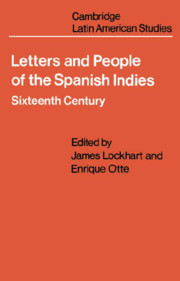Book contents
- Frontmatter
- Contents
- Preface
- Part I Conquest
- 1 Conquest in the personal view
- 2 A standard conqueror's report
- 3 The woman as conqueror
- 4 The merchant and the conquest of Peru
- 5 The merchant and the conquest of Mexico
- 6 The non-hero
- 7 The successful conqueror
- 8 The unsuccessful conqueror
- 9 The conqueror-governor
- 10 The conqueror in jail
- Part II The Variety of Life in the Indies
- Part III officials and Clerics
- Bibliography
- Index
8 - The unsuccessful conqueror
from Part I - Conquest
Published online by Cambridge University Press: 06 August 2018
- Frontmatter
- Contents
- Preface
- Part I Conquest
- 1 Conquest in the personal view
- 2 A standard conqueror's report
- 3 The woman as conqueror
- 4 The merchant and the conquest of Peru
- 5 The merchant and the conquest of Mexico
- 6 The non-hero
- 7 The successful conqueror
- 8 The unsuccessful conqueror
- 9 The conqueror-governor
- 10 The conqueror in jail
- Part II The Variety of Life in the Indies
- Part III officials and Clerics
- Bibliography
- Index
Summary
Bartolome Garcia, citizen of Asuncion, Paraguay, to the Council of the Indies, 1556
… And now, after twenty-one years, when I expected the reward for my efforts, you have left me without a share …
A companion piece to letter 7, this letter illustrates the case of a conqueror not granted a rich encomienda, an occurrence frequent enough that the volume of these complaints to governor, viceroy or king was great. Two types of attributes come into play here, personal and regional. Let us look first at the personal. Our Bartolome Garcia was not close to the governor (he was from Seville, while the governor was a Basque); he was no big man in the original expedition of don Pedro de Mendoza, no leader who would have to be respected over and above politics; and by all indications he was not well born. The plebeiansounding name is ambiguous and tells us little, but the lack in this whole complaint and petition of the slightest claim to be an hidalgo or gentleman tells us much. Low on all three counts, Bartolome Garcia emphasizes his services. Even through the heightening, we can see that they were great. But they were not the right kind. There were several skills and pursuits most useful in the Spanish conquests which had a public image such that accomplishments in them could not be brought to bear on encomienda grants. Great runners, scouts and spies had just as well not apply. Nothing related to the maritime profession counted. The most egregious example of this was in Mexico, where Martin Lopez, a ship's carpenter, supervised the building of the brigantines without which the siege of Tenochtitlan might have gone on indefinitely, and for his trouble received a quite minimal encomienda, shared with a colleague. As to Bartolome Garcia, he was a great huntsman and a fine crossbow shot, not the stuff encomenderos were made of, no matter how many deer he bagged and big cats he brought down.
In Mexico or Peru, even those first conquerors who were slighted had a half-tolerable situation, because their ‘small' encomiendas numbered some hundreds of Indians who sustained their households handily, produced some money revenue, and gave the encomenderos a base for their own entrepreneurial activity related to the strong local city markets.
- Type
- Chapter
- Information
- Letters and People of the Spanish IndiesSixteenth Century, pp. 47 - 52Publisher: Cambridge University PressPrint publication year: 1976

